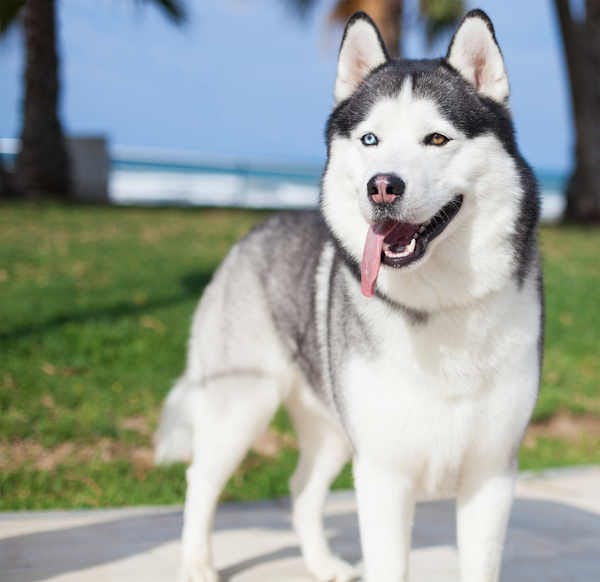Huskies are renowned for their striking appearance and vibrant energy, making them a beloved breed among dog enthusiasts. However, like all breeds, they come with their own set of health considerations that every prospective owner should be aware of.
Understanding the common health concerns, factors influencing their well-being, and effective care recommendations is crucial for ensuring a long, healthy life for these spirited companions. In this article, we will explore essential insights into Husky health, covering everything from prevalent diseases to optimal care practices, empowering you to provide the best possible environment for your furry friend.

Common Health Concerns
Huskies are celebrated for their energetic nature and striking appearance, but they can be prone to certain health issues. Here’s a closer look at some of the most frequently encountered conditions:
- Hip Dysplasia: This genetic condition occurs when the hip joint does not fit properly, leading to pain and potential arthritis. Regular vet check-ups can help monitor joint health.
- Progressive Retinal Atrophy (PRA): A hereditary eye disorder that can result in gradual vision loss, starting with difficulty seeing in dim light. Early detection is key to managing this condition.
- Hypothyroidism: An underactive thyroid can lead to weight gain, lethargy, and skin issues. Regular blood tests can help manage hormone levels effectively.
- Zinc-Responsive Dermatosis: A skin condition caused by insufficient zinc, leading to hair loss and skin lesions. A diet rich in zinc can help prevent this issue.
- Epilepsy: This neurological disorder is characterized by recurrent seizures, which may require lifelong treatment and careful monitoring.
- Cataracts: Clouding of the lens in the eye can impair vision and may necessitate surgical intervention. Regular eye exams can help catch this condition early.
- Corneal Dystrophy: A genetic condition affecting the cornea, leading to vision problems that may require veterinary care.
- Bleeding Disorders: Conditions that affect blood clotting can pose serious health risks and require immediate veterinary attention.
Factors Influencing Well-Being
Several factors can significantly impact the health of your Husky. Understanding these elements can help you provide better care:
- Genetic Background: Many health conditions are hereditary, making it essential to choose a reputable breeder who conducts thorough health screenings.
- Dietary Needs: A balanced diet rich in essential nutrients is crucial for preventing deficiencies that can lead to health problems. Consult your vet for dietary recommendations tailored to your dog’s needs.
- Physical Activity: Huskies are high-energy dogs that require regular exercise. Insufficient activity can lead to obesity and behavioral issues. Aim for at least an hour of exercise daily.
- Age-Related Changes: As dogs age, they may develop conditions like arthritis or vision problems, necessitating adjustments in care and lifestyle.
Life Expectancy
The average lifespan of a Husky typically ranges from 12 to 15 years. Factors such as genetics, diet, exercise, and overall care play significant roles in determining their longevity. Regular veterinary check-ups and a healthy lifestyle can contribute to a longer, healthier life.
Care Recommendations for Optimal Health
Providing the best care for your Husky is essential for their health and happiness. Here are some expert recommendations:
- Routine Veterinary Visits: Schedule annual check-ups and vaccinations to monitor health and catch any issues early.
- Nutritious Diet: Offer a high-quality diet tailored to your dog’s age, weight, and activity level to prevent deficiencies.
- Regular Exercise: Ensure your Husky engages in daily physical activity to maintain a healthy weight and prevent destructive behaviors.
- Grooming: Regular grooming helps manage shedding and promotes skin health, especially during seasonal changes.
- Training and Socialization: Consistent training and socialization are crucial for developing a well-adjusted and obedient companion.
Health Management Strategies
Health Management Strategies
Managing the health of your Husky involves a combination of preventive care, regular monitoring, and lifestyle adjustments. Here are some effective strategies:
| Strategy | Description | Benefits |
|---|---|---|
| Regular Vet Check-ups | Annual visits to the veterinarian for health assessments and vaccinations. | Early detection of health issues, updated vaccinations, and overall health monitoring. |
| Balanced Diet | A diet formulated for Huskies, rich in proteins, vitamins, and minerals. | Supports overall health, maintains a healthy weight, and prevents deficiencies. |
| Consistent Exercise | Daily physical activities such as walks, runs, and playtime. | Prevents obesity, reduces behavioral issues, and promotes mental stimulation. |
| Grooming | Regular brushing and bathing to maintain coat health and reduce shedding. | Improves skin health, reduces allergens, and enhances bonding time. |
| Training and Socialization | Positive reinforcement training and exposure to various environments and people. | Encourages good behavior, reduces anxiety, and fosters a well-adjusted dog. |
1. Regular Vet Check-ups
Routine veterinary visits are crucial for monitoring your Husky’s health. These check-ups should include vaccinations, dental care, and overall health assessments. Early detection of potential health issues can lead to more effective treatments and better outcomes.
2. Balanced Diet
A nutritious diet is essential for maintaining your Husky’s health. Choose a high-quality dog food that is specifically formulated for their age, weight, and activity level. This helps prevent deficiencies and supports their overall well-being.
3. Consistent Exercise
Huskies are high-energy dogs that require ample physical activity. Aim for at least an hour of exercise each day, which can include walks, runs, or playtime. Regular exercise helps maintain a healthy weight and prevents destructive behaviors.
4. Grooming
Regular grooming is important for Huskies, particularly during shedding seasons. Brushing helps remove loose fur and dirt, promoting skin health. Additionally, grooming sessions can strengthen the bond between you and your dog.
5. Training and Socialization
Investing time in training and socialization is vital for your Husky’s mental and emotional health. Use positive reinforcement techniques to encourage good behavior and expose your dog to different environments, people, and animals to reduce anxiety and foster adaptability.
Pros and Cons of Owning a Husky
Before bringing a Husky into your home, it’s important to weigh the advantages and challenges:
| Pros | Cons |
|---|---|
| Highly energetic and playful | Requires a lot of exercise and mental stimulation |
| Friendly and social with families | Can be stubborn and challenging to train |
| Beautiful and striking appearance | Prone to certain health issues |
| Good with children and other pets | May have a strong prey drive |
| Adaptable to various living situations | Can be vocal and may howl |
Key Points to Remember
Here are some essential takeaways for prospective Husky owners:
- Choose a reputable breeder who screens for genetic conditions.
- Provide a balanced diet tailored to your dog’s specific needs.
- Engage in daily exercise to keep your Husky healthy and happy.
- Regular grooming is essential to maintain coat health and reduce shedding.
- Invest time in training and socialization to foster good behavior.
- Be aware of common health issues and monitor your dog for any signs of concern.
Seasonal Care for Huskies
Caring for Huskies requires attention to their needs throughout the changing seasons. Each season presents unique challenges and requirements regarding grooming, exercise, and health precautions.
Spring
As the weather warms up, Huskies begin to shed their winter coats. Regular grooming becomes essential to manage shedding and prevent matting. Brush your Husky at least a few times a week to remove loose fur. During this season, ensure your dog remains hydrated and adjust exercise routines to avoid overheating during warmer days.
Summer
In the summer heat, Huskies can be particularly susceptible to heatstroke due to their thick double coats. Limit outdoor activities to early morning or late evening when temperatures are cooler. Always provide plenty of fresh water and shade. Consider a shorter grooming schedule to help them stay cool, but avoid shaving their coats, as this can lead to sunburn and overheating.
Fall
As temperatures begin to drop, Huskies will start to grow their winter coats. This is an excellent time to switch to a grooming routine that accommodates their changing fur. Regularly check for any skin issues or parasites that may have developed during the warmer months. Continue to provide ample exercise, but be mindful of the temperature changes, ensuring they don’t get too cold during outdoor activities.
Winter
Huskies are well-adapted to cold weather, but precautions are still necessary. Regular exercise is crucial, but be aware of their limits in extreme cold. After walks, check their paws for ice or snow buildup, which can cause discomfort. Maintain a consistent grooming routine to prevent matting from snow and ice. Ensure they have a warm, dry place to rest indoors, and monitor their food intake, as they may require more calories to maintain body heat.
By adjusting your Husky’s care routine to accommodate seasonal changes, you can help ensure their health and happiness year-round. Always pay attention to their behavior and comfort levels, and consult your veterinarian if you have concerns about their health during any season.
Care Considerations for Aging Huskies
As Huskies age, they may face various health issues that require special attention and care. Common conditions in older Huskies include arthritis, hip dysplasia, and vision problems such as cataracts or progressive retinal atrophy. To help manage these issues, it is crucial to adjust their care regimen accordingly.
Changes in Diet
Aging Huskies may benefit from a diet formulated specifically for senior dogs. These diets often contain fewer calories, higher fiber, and added joint support supplements like glucosamine and chondroitin to help maintain joint health. It’s important to consult with a veterinarian to determine the best dietary plan tailored to your dog’s specific needs and health conditions.
Exercise Adjustments
While Huskies are known for their high energy levels, older dogs may not require the same intensity of exercise as they did in their younger years. However, regular, moderate exercise remains essential to prevent obesity and maintain muscle tone. Shorter, more frequent walks and low-impact activities, such as swimming or gentle play, can help keep your aging Husky active without overexerting them.
Veterinary Care
Regular veterinary check-ups become even more critical as your Husky ages. Routine health assessments can help monitor for age-related conditions and ensure any emerging health issues are addressed promptly. Your veterinarian may recommend more frequent visits, blood tests, and screenings to catch potential problems early.
By being proactive about these changes in diet, exercise, and veterinary care, you can help ensure that your aging Husky remains comfortable, healthy, and happy throughout their golden years.
Responsible Breeding Practices
Responsible breeding is crucial in ensuring the health and well-being of Huskies. Breeders who prioritize health screenings and genetic testing can significantly reduce the risk of hereditary diseases that are common within the breed. By selecting breeding pairs based on their health history and genetic compatibility, reputable breeders can help prevent the transmission of conditions such as hip dysplasia, progressive retinal atrophy, and hypothyroidism. Additionally, responsible breeders provide prospective owners with vital information about the genetic background of their puppies, enabling them to make informed decisions and prepare for any potential health issues. Ultimately, choosing a reputable breeder who adheres to ethical practices not only enhances the quality of the breed but also promotes a healthier and happier life for these beloved dogs.
Conclusion
In conclusion, owning a Husky comes with unique responsibilities and rewards. By being informed about the common health concerns and the factors that influence their well-being, you can take proactive steps to ensure your furry friend leads a happy and healthy life. Regular veterinary visits, a balanced diet, consistent exercise, and proper grooming are essential components of Husky care. Remember, a well-cared-for Husky not only thrives physically but also enjoys a fulfilling emotional life, making them a cherished member of your family for many years. With the right knowledge and commitment, you can enjoy the companionship of this remarkable breed while safeguarding their health and happiness.
Additional Resources
For more information on Husky health and care, consider the following resources:
